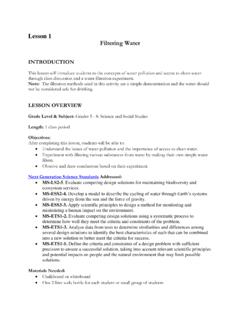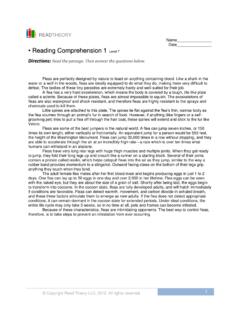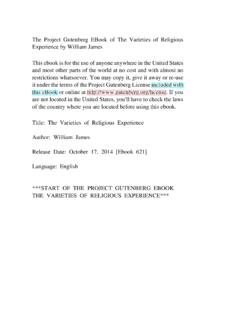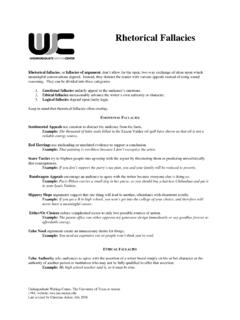Transcription of FISH - Earth Day
1 fish . FACTS ABOUT fish . fish can be found in all bodies of water: lakes, rivers, seas, oceans, and ponds. In total, it is estimated that there are over 32,000 different species of fish The difference in size amongst fish is as wide as the oceans themselves! A cyprinid fish , the world's smallest, is only .3 inches long194 while the Whale Shark is one of the world's largest at over 30 feet long!195. The amount of fish that humans capture is staggering. In 2016, an estimated 91 million tons of fish were It is becoming clearer that humans are overfishing and destabilizing the marine ecosystem.
2 Within the last century, over two-thirds of the population of predatory fishes, such as sharks, have also Overall, there has been a decrease in both biodiversity and abundance irrespective of what marine ecosystem is WHY WE NEED TO PROTECT fish . Role in the Ecosystem: fish make a major contribution to their ecosystem: providing essential nutrients that support the whole Simply put, fish are excellent recyclers of the nutri- ents that algae and other bottom-level species need to survive that in turn support the remainder of the ecosystem. The importance of this function suggests that overfishing can be highly detrimental to the proper functioning of the whole Ecosystem Services: Fisheries provide both ample ecosystem services for a great number of Specifically, species of fish provide both recreational Protect Our Species Primer and Action Toolkit and cultural services around the world from sport fishing in ponds to various religious Economic Contribution.
3 Food from fish alone generated $ billion in value for Globally, the supply chain of fisheries employs an estimated 120 million people, with 116 million of these jobs located in the developing Uniqueness: As fish are found in all different habitats around the world, from deep in the ocean to shallow streams, fish have evolved and adapted to their respective habitats in fascinating ways. For instance, some species of fish navigate and hunt through electroreception, a process by which they detect and respond to electrical stimuli, to learn things such as the speed of the 74.
4 Earth DAY NETWORK. THREATS TO fish . Climate Change: Rising water temperatures in oceans and seas threaten to disrupt the migration and distribution of numerous fish species,206 from the Pacific Ocean to the Mediterranean What is more, many species of fish are decreasing in size as a result of climate Most concerning, the degradation of coral reefs due to rising sea temperatures has had disastrous effects on the fish species that are supported by the reef; according to one study, the loss of coral reefs in Papua New Guinea led to a 50% decline in the population of the endemic fish Lastly, roughly a third of all carbon emissions from fossil fuels is absorbed by the ocean; this has made oceans about 30%.
5 More acidic in the last few As the ocean acidifies, species that support the well-being of fish , such as coral and oysters, face difficulty in forming their Habitat Loss: Since the 1960s, the amount of water held by dams in reservoirs has quadrupled, severely impacting the population levels of freshwater Also, agricultural development, water treatment facilities, and raw sewage pollute fish 's Overfishing: Around 35% of the world's fish stocks were overfished in The European eel, to use one example, has seen its population decrease by over 90% since the The Atlantic salmon has seen its population decrease by 90% as Ocean Pollution: Pollution in a fish 's aquatic home can come in many forms and from different sources chemicals from produc- tion plants, plastic from waste facilities, fertilizers from agriculture but the end result is exactly the same.
6 It either severely harms or kills Not only does pollution affect the fish and their ecosys- tems, but the effects of pollution make their way back to the pol- luters (us) in the form of contaminated In one instance, the Deepwater Horizon oil spill in the Gulf of Mexico in April 2010. decimated much of the region's fisheries and inflicted an estimated $ billion in economic HOW TO HELP fish . Prevent Water Pollution: Whether you are by a body of water or farther inland, chemicals and pollut- ants linked to human activity make their way to the ocean.
7 Helpful actions include properly disposing of waste or recyclables and reducing or eliminating lawn and garden fertilization. Plastic debris in waters is a big problem for fish ingestion and entanglement are among the problems. Actions such as joining or organizing a beach or river cleanup, switching to reusable plastic bags, and reducing plastic consumption overall can help prevent and reduce the risk to fish and other marine life. Support Sustainable Fisheries: Overfishing can deplete fish populations past the point of recovery. Protect Our Species Primer and Action Toolkit By buying fish and fish products from certified sustainable sources, you can help ensure that the fish and their ecosystems continue to thrive.
8 To learn more about the different types of eco-labeling, click here. Test your knowledge about threats to ocean ecosystems with our Oceans Plastic Pollution Quiz. Help End Plastic Pollution by learning about the actions you can do with our Plastic Pollution Primer and Action toolkit. Check out all of Earth Day Network's resources to help Protect our Species. Sign our pesticide pledge. 75.. Earth DAY NETWORK. ADDITIONAL RESOURCES. ARTICLES/BLOGS/READINGS. Scientists hope DNA in water could be way to save rare fish Associated Press Scientists in Maine are using DNA to try to preserve the remaining populations of a fish that lives in 14.
9 Lakes and ponds in the state and nowhere else in the continental United States. VIDEOS. These are the Ocean's Protected Areas and We Need More National Geographic The ocean faces many challenges, but has the extraordinary power to replenish when it is protected. Marine protected areas facilitate resilience and recovery for degraded areas of the ocean, and offer opportunities to rebuild stocks of commercially important species, such as various fish species. STORYTELLING. TEDx Talk: Are fish Smart? Do They Have Personalities? - Even Moland In studying the behaviour and movement of fish and lobsters how they live, where they hide, which ones are caught by fishers, and which ones escape to obtain large sizes and old age he's also learning how marine populations can be protected.
10 OTHERS WORKING ON THIS. Deep Sea Conservation Coalition The DSCC was founded in 2004, to address the issue of bottom trawling on the high seas in the absence of an effective governance regime. The coalition is made up of over 70 non-governmental organisations, fishers organisations and law and policy institutes, all committed to protecting the deep sea. REPORTS. Protect Our Species Primer and Action Toolkit Agriculture's Impact on Aquaculture: Hypoxia and Eutrophication in Marine Waters OECD. This report summarizes and assesses the environmental externalities of nutrient enrichment, eutrophi- cation, and hypoxia associated with the expanding agriculture on the aquaculture sector.








